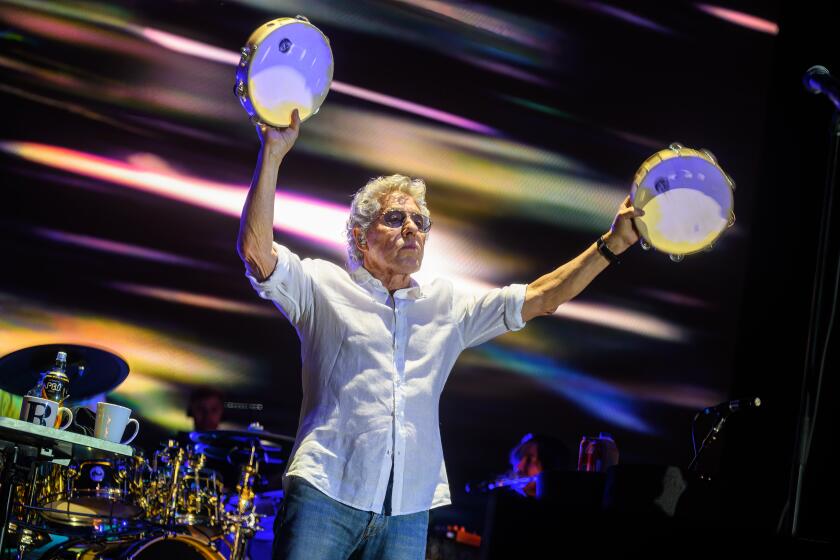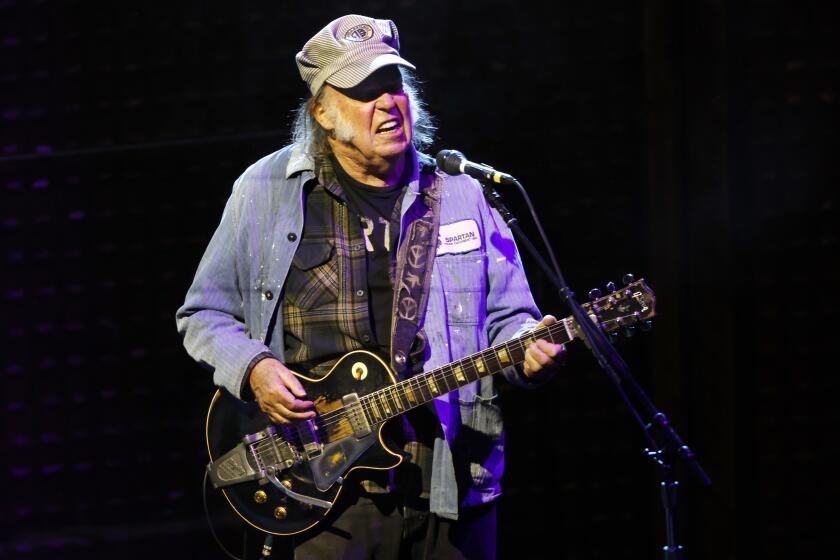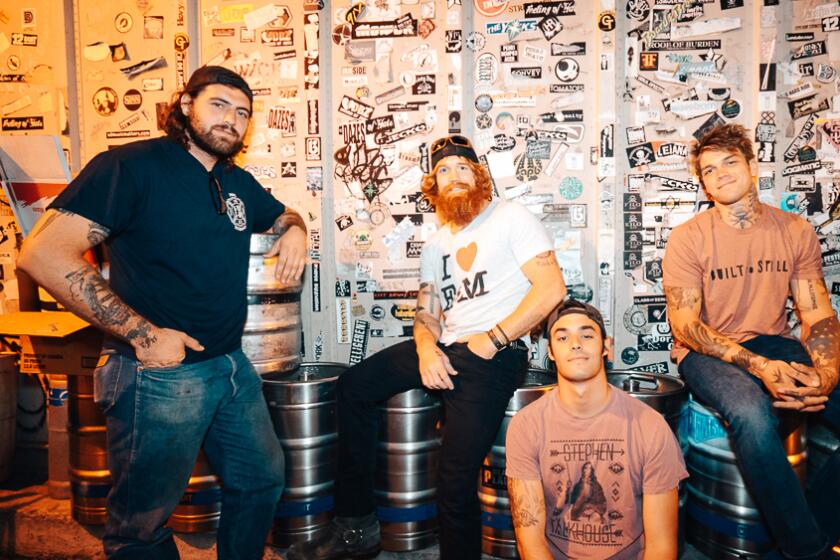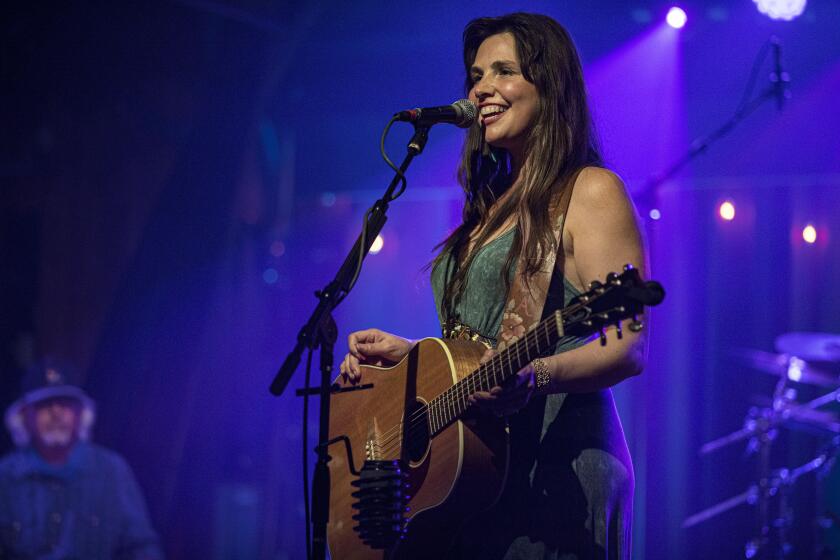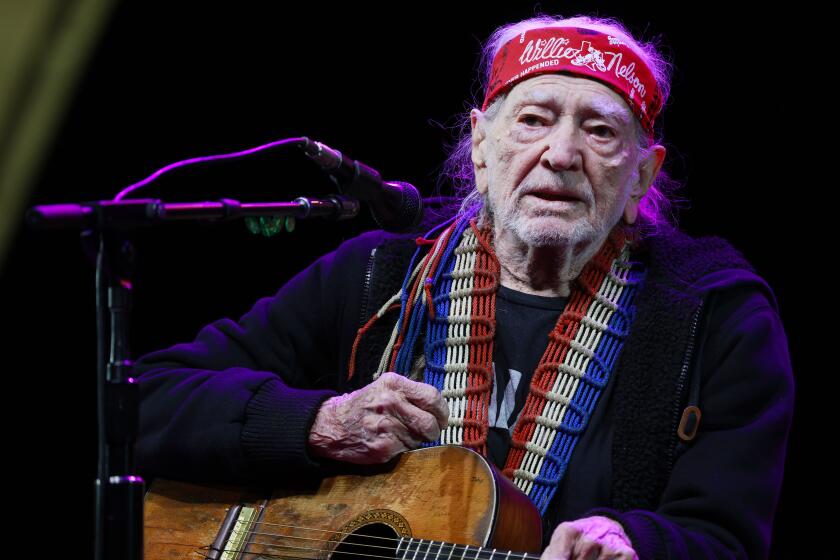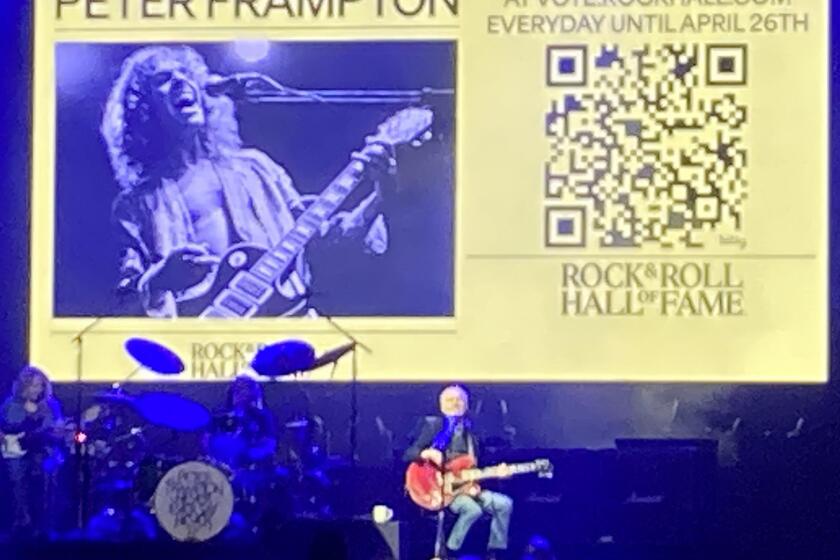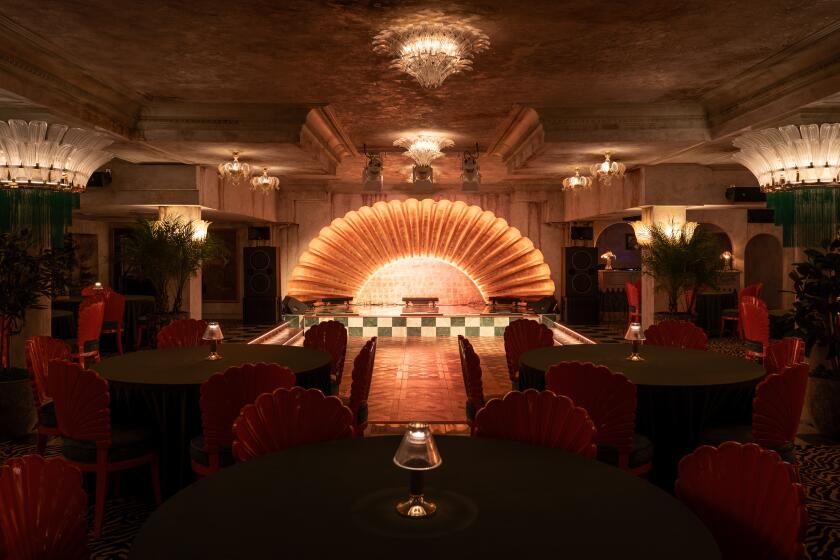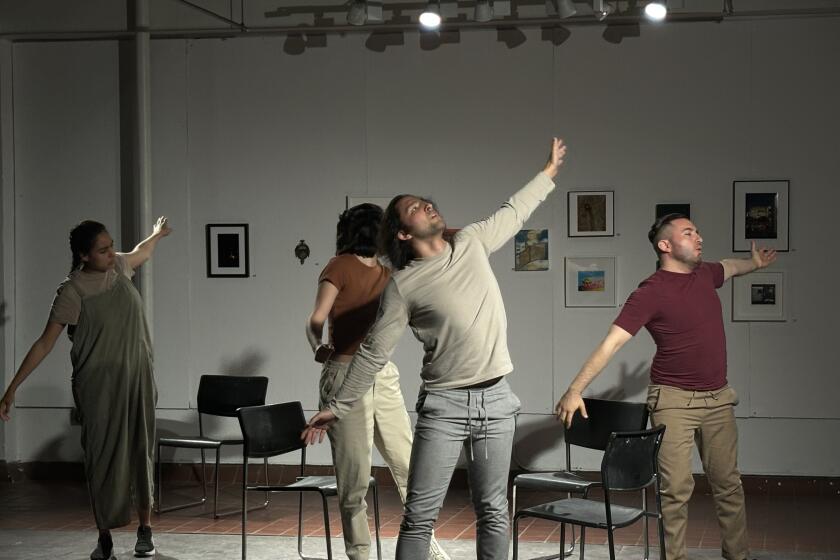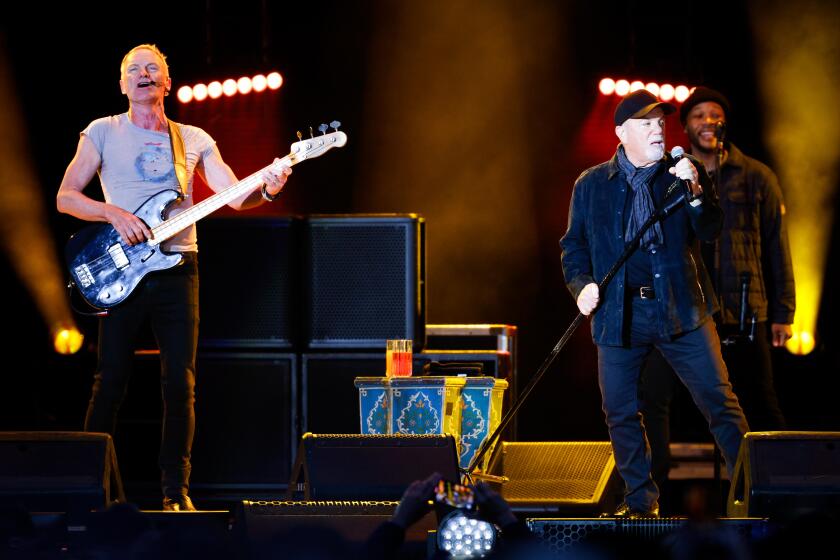Jethro Tull founder Ian Anderson on music, flutes, morphine drips and why he can’t stand hippies
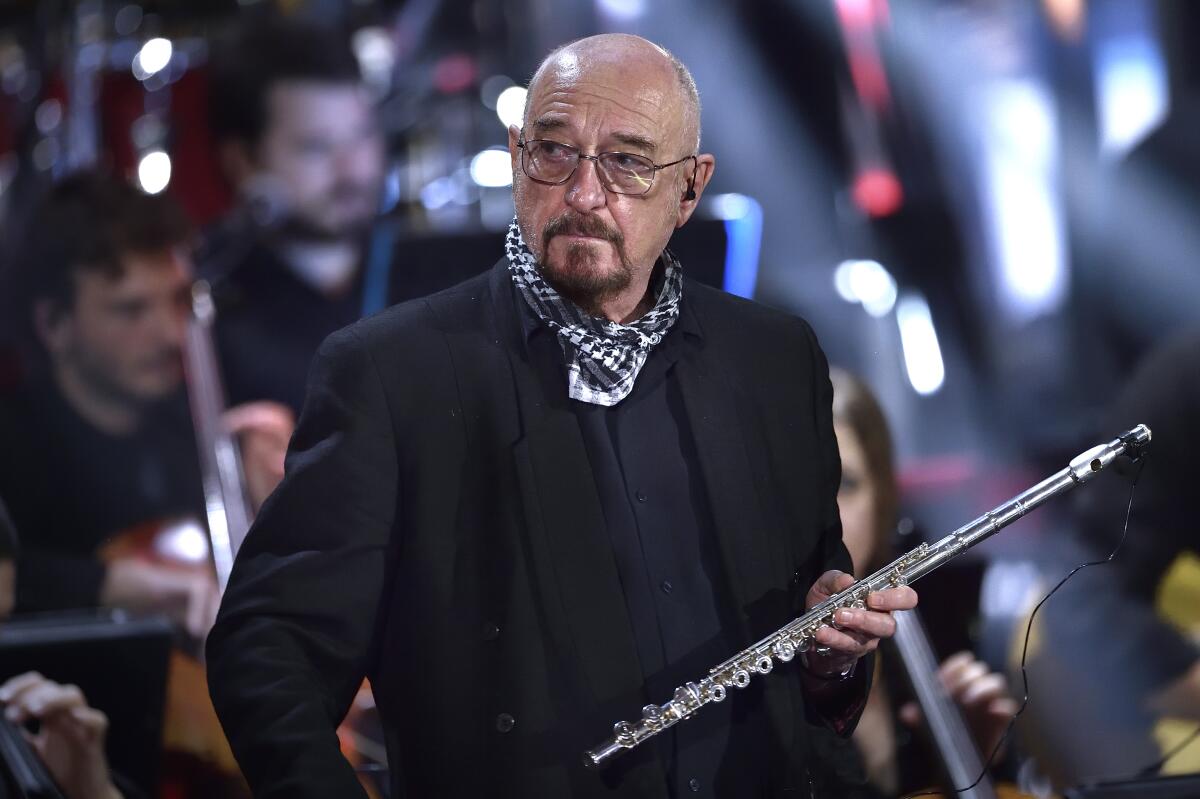
The flute-playing founder and leader of Jethro Tull is the band’s only member who has been in all of the 30-plus lineups of the band. Nick Cave and Metallica’s Kirk Hammett are fans
Ian Anderson is understandably pleased Jethro Tull — the pioneering progressive-rock band he founded and has led since 1967 — has sold more than 60 million albums worldwide and is now embarked on the aptly named “The Seven Decades Tour.” It includes a Tuesday San Diego concert at The Rady Shell at Jacobs Park.
The veteran flutist, singer, songwriter and guitarist is also pleased Jethro Tull counts a number of high-profile musicians among its fans. They include former R.E.M. singer Michael Stipe, Metallica guitarist Kirk Hammett, Nick Cave and members of the bands Midlake and The Decemberists, as well as actress Lisa Lampanelli.
Cited as an inspiration by everyone from Nick Cave to the band Midlake, Jethro Tull is now 51 years old, but band founder Ian Anderson is not one for nostalgia.
But Anderson scoffs when asked if he has seen any unlikely fans — a contentious political figure, perhaps — turn up at Jethro Tull’s concerts.
“I have no idea who is in the audience; they are all strangers to me,” he replied, speaking from his home in Wiltshire, England. “But that’s part of the appeal. You are in front of people you don’t know, will never meet, and don’t want to know.
“Concerts give you the opportunity to make some new friends, or some new enemies. Then, after the show, I disappear into my little dressing room and crawl under a rock, because I’m not a social creature.”
Depending on the day and his mood, Anderson can indeed be a prickly character on occasion. He can also be warm, endearing and an insightful commentator on his chosen profession. He is the only member of Jethro Tull who has been in all of its 30-plus lineups.
“Sometimes the people you dread meeting — because of anecdotal, spurious hearsay — turn out to be the nicest people,” Anderson said. “Sadly, the opposite is true, as well. People you think are going to be nice turn out not to be. I guess I’m the same.
“Catch me on the right day and you’re fine. But I’m sure I’ve disappointed some people who were catching me at the wrong moment, when I didn’t want to have to stop — in mid-mouthful in a restaurant — to take a selfie with them.”
Flute first, then and now
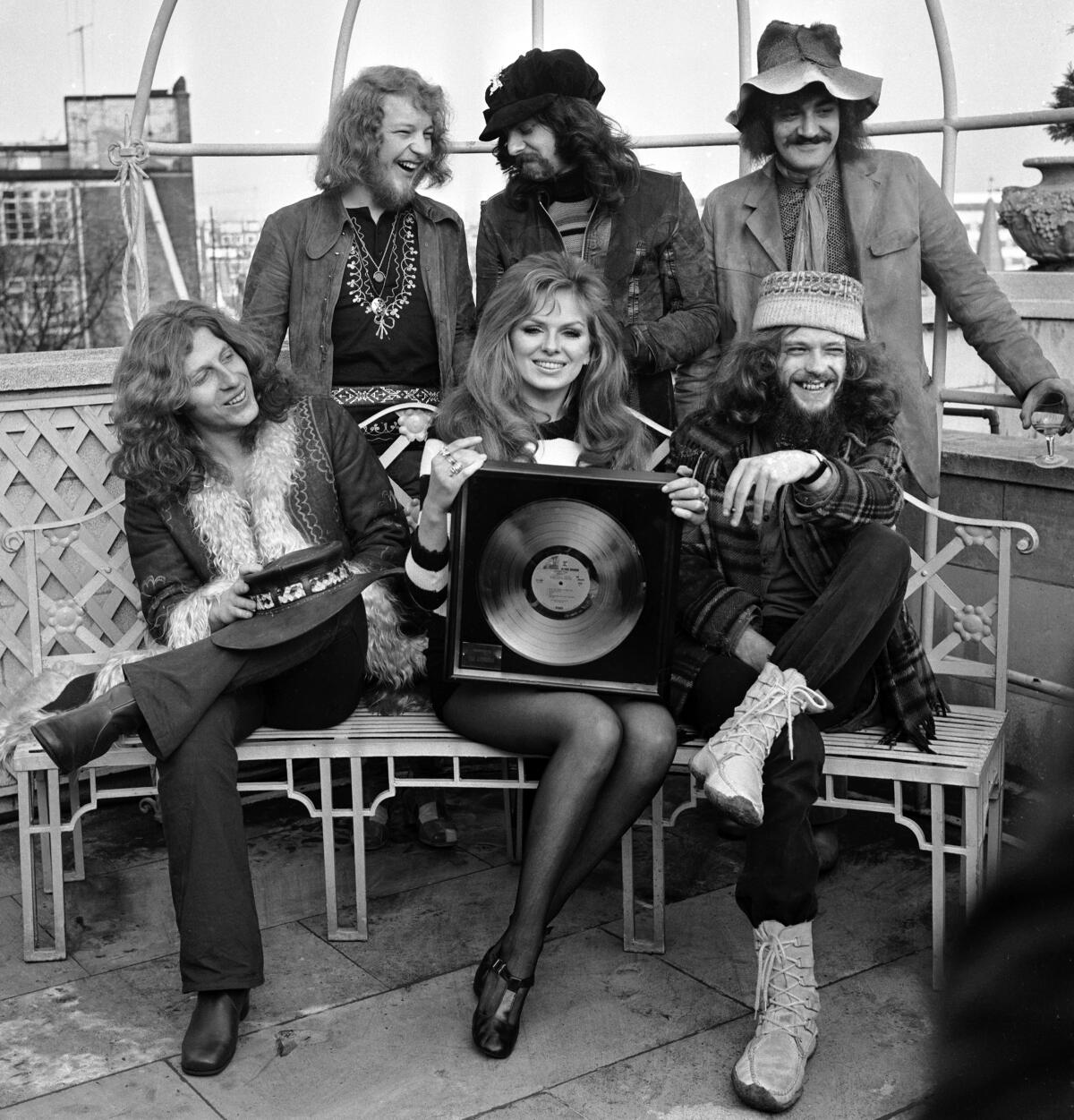
The Scottish-born Anderson turned 76 in August, 58 years after Tull — the band long synonymous with his name — was launched as a jazzy blues-rock ensemble.
Its latest album, the 12-song “RökFlöte,” was released this year and boasts lyrics inspired by the polytheistic beliefs of Norse mythology. The band’s 2022 album, “The Zealot Gene,” finds Anderson exploring themes of political fanaticism and using biblical texts to reflect on current events.
With Anderson’s 80th birthday just four years away, how important is it for him to surprise himself when creating new music?
“It’s incredibly important when you’re recording it,” he said. “And I’m pretty pleased with my aspirations to continue making music that we have brought to fruition through good luck and hard work. (It’s like) riding a bike. If you fall off, there’s a danger you might not be able to get back on. So, it’s good not to fall off.”
Jethro Tull’s most popular album, 1971’s “Aqualung,” has sold more than 12 million copies. Tull’s wildly ambitious 1972 concept album, “Thick as a Brick,” made history in at least two ways.
It is the only release to ever top Billboard magazine’s U.S. album charts that consists of just one song — albeit a very extended, complex song that lasts nearly 44 minutes. Moreover, “Brick” was a progressive-rock opus that simultaneously parodied the bombast and self-indulgence of progressive-rock.
Like all of Jethro Tull’s albums before and since, it featured Anderson singing and playing the flute. The instrument had not previously been a focal point of any rock band. But Anderson changed that, starting with Jethro Tull’s 1968 debut album, “This Was.” Nearly every song on it boasts prominent flute work, none more so than the spirited version of jazz sax and flute great Roland Kirk’s vocal-free 1965 classic, “Serenade to a Cuckoo.”
That Jethro Tull was led by a bearded, long-haired, seemingly crazed young musician — who often played flute and sang while perched on one leg — added to the band’s image and appeal.
Anderson discussed his move to the flute in a 1988 San Diego Union-Tribune interview, saying: “I was a not-very-good singer in a not-very-good blues band. And so I started also to play not-very-good harmonica, and ended up playing not-very-good flute. I did it largely because it was different, and because it was there.”
In 1967, the year Tull was formed, only a few rock bands memorably utilized a flute, but not as a lead instrument. One was the American band The Blues Project. The other two were both English: The Moody Blues and Family.
Did any of these bands inspire Anderson as a “not-very-good flutist?” In a word: no.
“What inspired me as a flute player was Eric Clapton, because it was his guitar playing I wanted to emulate,” he said.
The English blues-rock legend discusses Cale & ‘The Breeze,’ Clapton’s heartfelt tribute to his close musical friend and longtime Valley Center troubadour.
“It was really my determination to do something other than play the ubiquitous electric guitar, which everybody wanted to do — including me — when I was a teenager. I quickly realized Eric Clapton, Jeff Beck, Jimmy Page and (Deep Purple’s) Ritchie Blackmore were the wiz-kid guitar players down in London and were way ahead of me.
“That made me look for something else to play. But I had no idea what to do with the flute once I got a couple of notes out of it. I tried to play the blues and went on from there. Like anything else, you realize there is more to it, so I did listen to a few other players, including — after a few months — Roland Kirk.”
But Kirk, Anderson contends, was not his primary influence.
“One of my favorites as a teen was Mose Allison,” he said. “Mose would mumble and sing along with his piano playing, which was rather endearing. I suspect I picked up on scat-singing (while playing flute) from him and other people in the world of jazz more than from a flute player like Roland Kirk.”
His songs were recorded by such high-profile admirers as Bonnie Raitt, The Who, Diana Krall, The Kinks, Van Morrison, Blue Cheer and many more
In the early 1970s, then-still-fledgling Anderson topped the masterful Kirk as the No. 1 flutist in Playboy’s annual jazz and pop poll. Was Anderson flattered, embarrassed, or both, at this turn of events?
“Well,” he answered, “I did actually meet Roland Kirk, who I was terrified of. Because word was that he was a pretty intimidating person and not flattering or kind to other people. We met when I played this jazz festival in 1969 on the East Coast, I don’t remember where.
The Newport Jazz Festival in Rhode Island?
“Yes, Newport,” Anderson said. “I don’t know why they booked us and Led Zeppelin, which seemed weird. Our manager said: ‘Roland Kirk wants to meet you.’ I thought: ‘Oh, god, what am I going to do?’ Plus, Kirk was blind which made it even more difficult to confront him in a social setting. But he was really kind and nice. Or, at least, he pretended to approve of my rendition of his song because he was getting the mechanical royalties for it!
“Many years later, Kirk’s second wife (Dorothea) showed up at one of our shows in New Jersey, long after he was dead. She said: ‘Thanks. I get a (royalty) check twice a year for your performance of Roland’s song and it’s helped to have that coming in to help pay the bills.”
Nyet to Russian oligarchs
Paying bills has not been a problem for Anderson since Jethro Tull began selling millions of albums and filling arenas in the 1970s. By the 1980s he owned several salmon farms in Scotland. At their peak, they employed 400 people and — in 1997 alone —produced 900 tons of smoked salmon, with annual revenues of $26 million.
Commenting on his fish-fueled entrepreneurship in a 1988 Union-Tribune interview, Anderson said he would rather be remembered for providing hundreds of new jobs than for selling tens of millions of albums.
“I guess I’m a socialist at heart,” he said at the time. “Actually, I’m a communist bastard at heart, but I live in a capitalist world, so I try to be a good capitalist. My kids usually prefer to say: ‘My daddy’s a fish farmer.’ It’s easier to say that than: ‘He plays in an old man’s rock group with these fat, balding fellows!’ ”
By 2003, Anderson had sold his salmon farms and processing plants. His concert tours with Jethro Tull and as a solo artist are a near-constant. And he has the financial liberty of declining performance opportunities as he sees fit.
“There are quite a few offers that have come my way, for large amounts of money,” Anderson acknowledged. “The offers are to do things I feel are quite inappropriate, whether it’s a private party for some Russian oligarch, or a cruise ship tour, or things at big, multi-act festivals. I think I know what I’m worth and there are times I would not do things just for the paycheck. It’s not worth it.”
By his count, Anderson has performed in 55 countries on at least five continents. He recalls first encountering Russian President Vladimir Putin at a 1992 Jethro Tull concert in St. Petersburg. At the time, former KGB agent Putin was the chairman of the city’s External Relations Committee and an assistant to its mayor.
“We were supposed to play in Kyiv last year on a tour that we had to cancel because of the invasion of Ukraine by Putin,” Anderson lamented. “And we canceled our tour of Russia, where I’ve enjoyed playing in the past. Given Putin’s propensity for extremism — and his desire to rebuild the Soviet Union to resemble what it was when he was an officer in the KGB — I don’t expect we’ll ever play again in Russia in my lifetime.”
Earlier in his lifetime — 1969, to be exact — Anderson turned down an offer for Jethro Tull to perform at the now-legendary Woodstock festival, citing the fact that he didn’t “like hippies.” In the 1970s he sometimes berated concertgoers for smoking pot because the smoke impacted his singing and flute-playing.
Yet, in photos of Jethro Tull in the late 1960s and early ‘70s, Anderson looked very much like a full-blown hippie.
“Clearly, my personal outlook was very much not aligned with the hippie lifestyle, especially when it came to drugs,” he said. “It wasn’t as individuals — some of them were probably nice people, if they ever had a shower — but the lifestyle seemed synonymous with all the drugs and the ‘free sex’ thing, which I just never got the hang of...
“I didn’t go in that direction, and I‘m glad I didn’t. But in my final years, I might deduce I want to catch up on that. And there’s a 50 percent chance I’ll end my days on a morphine drip.”
He chuckled.
“Of course, at my age there is that element of uncertainty,” said Anderson, who titled Jethro Tull’s 1976 album “Too Old to Rock ‘n’ Roll, Too Young to Die.”
“You have to be realistic about longevity, potential ill health and the onset of dementia,” he continued. “Although, theoretically, for people who do what I do there’s a fighting chance of staving that off. Because, playing concerts and making new music, we are so engaged with the process of concentration, performance and remembering things we did last night and 50 years ago.
“Ultimately, nothing will save us but our genes. But, to some extent with music, you can increase your odds of longevity.”
Jethro Tull: The Seven Decades Tour
When: 7:30 p.m. Tuesday
Where: The Rady Shell at Jacobs Park, 222 Marina Park Way, downtown
Tickets: $45-$170
Phone: (619) 235-0804
Online: theshell.org
Get U-T Arts & Culture on Thursdays
A San Diego insider’s look at what talented artists are bringing to the stage, screen, galleries and more.
You may occasionally receive promotional content from the San Diego Union-Tribune.

